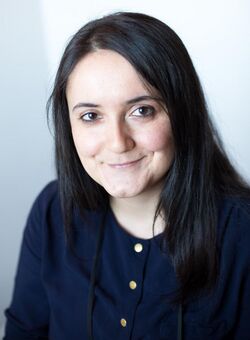Biography:Duygu Kuzum
Duygu Kuzum | |
|---|---|
 Kuzum at PopTech 2013 | |
| Born | 1983 (age 40–41) |
| Alma mater | Stanford University Bilkent University |
| Scientific career | |
| Institutions | Jacobs School of Engineering, UCSD University of Pennsylvania |
| Thesis | Interface-engineered Ge MOSFETs for future high performance CMOS applications (2010) |
Duygu Kuzum (born 1983) is a Turkish-American electrical engineer who is a professor at the University of California, San Diego's Jacobs School of Engineering. She develops transparent neural sensors based on single-layer materials. She was awarded a National Institutes of Health New Innovator Award in 2020.[1][2]
Early life and education
Kuzum was born in Ankara, Turkey.[3] She became interested in science as a child.[4] She attended Bilkent University[5][6] and was a doctoral researcher at Stanford University.[7] Her doctoral research considered MOSFETs for CMOS applications. During her doctorate, she completed an internship at Intel.[citation needed] In 2011, she joined the University of Pennsylvania as a postdoctoral researcher,[8] working in the Center for Neuroengineering and Therapeutics on the development of transparent neural electrodes.[8]
Research and career
Kuzum joined the University of California, San Diego in 2015.[1] Her research focuses on innovative computation strategies based on neural networks.[4] She combines molecular neural sensors with machine learning to better understand neural processes.[9] She has built self-assembled structures from stem cells embedded with controllable neural sensors to mimic the embryonic human brain.[1]
Awards
- 2013 Poptech Fellow[10]
- 2014 MIT Technology Review Innovators under 35[3]
- 2016 Office of Naval Research Young Investigator Award[11]
- 2017 IEEE Nanotechnology Council Young Investigator Award[12]
- 2018 NSF Career Award[13]
- 2018 National Institutes of Health NIBIB Trailblazer Award[14]
- 2020 National Institutes of Health New Innovator Award[1][2]
Selected publications
References
- ↑ 1.0 1.1 1.2 1.3 Labios, Liezel (2020-10-06). "Two UC San Diego Researchers Receive NIH High-Risk, High-Reward Awards" (in en). https://today.ucsd.edu/story/two-uc-san-diego-researchers-receive-nih-high-risk-high-reward-awards.
- ↑ 2.0 2.1 Calabrese, Ryan (2020-10-21). "2020 NIH Director's Awards Granted to Three BRAIN Initiative Scientists" (in en-US). https://www.braininitiative.org/2020/10/21/2020-nih-directors-awards-granted-to-three-brain-initiative-scientists/.
- ↑ 3.0 3.1 Hall, Stephen (2014-08-19). "Pioneers: Duygu Kuzum" (in en). https://www.technologyreview.com/innovator/duygu-kuzum/.
- ↑ 4.0 4.1 Rojas-Rocha, Xochitl. "Profile on ECE Professor Duygu Kuzum | Electrical and Computer Engineering". https://ece.ucsd.edu/profile-on-ece-professor-duygu-kuzum.
- ↑ "Neuroelectronics group". http://neuroelectronics.ucsd.edu/people.html.
- ↑ "Duygu Kuzum | Faculty profile". https://jacobsschool.ucsd.edu/people/profile/duygu-kuzum.
- ↑ "Duygu Kuzum – 2018-Oct Kavli Futures Symposium: Next-Generation Neurotechnology for Research and Medicine". https://neurotech2018.kavlimeetings.org/participants/duygu-kuzum/.
- ↑ 8.0 8.1 Stone, Madeleine (2014-08-29). "Penn Engineering Postdoc Duygu Kuzum Is One of 'Innovators Under 35'" (in en). https://penntoday.upenn.edu/news/penn-engineering-postdoc-duygu-kuzum-one-mit-technology-reviews-innovators-under-35.
- ↑ Park, Katie (2018-03-29). "Neuroengineering Meets Nanoelectronics: Neuro-inspired Systems and Neural Interfaces" (in en-US). https://minghsiehece.usc.edu/2018/03/neuroengineering-meets-nanoelectronics-neuro-inspired-systems-and-neural-interfaces/.
- ↑ "PopTech : People : Duygu Kuzum". https://past.poptech.org/people/duygu_kuzum.
- ↑ Fox, Tiffany (2016-03-23). "UC San Diego Electrical Engineer Awarded Young Investigator Award from U.S. Office of Naval Research" (in en). Qualcomm Institute at UC San Diego. https://jacobsschool.ucsd.edu/news/release/1908.
- ↑ "2017 Awardees" (in en-US). https://ieeenano.org/awards/2017-awardees.
- ↑ "NSF Award Search: Award # 1752241 - CAREER:Bio-artificial Neuromorphic System Based on Synaptic Devices" (in en). 2018-01-16. https://www.nsf.gov/awardsearch/showAward?AWD_ID=1752241&HistoricalAwards=false.
- ↑ "Alumnus Prof. Duygu Kuzum receives the NIH NIBIB Trailblazer Award | Nanoelectronics Lab" (in en). 2016-07-01. https://nano.stanford.edu/news/alumnus-prof-duygu-kuzum-receives-nih-nibib-trailblazer-award.
 |

